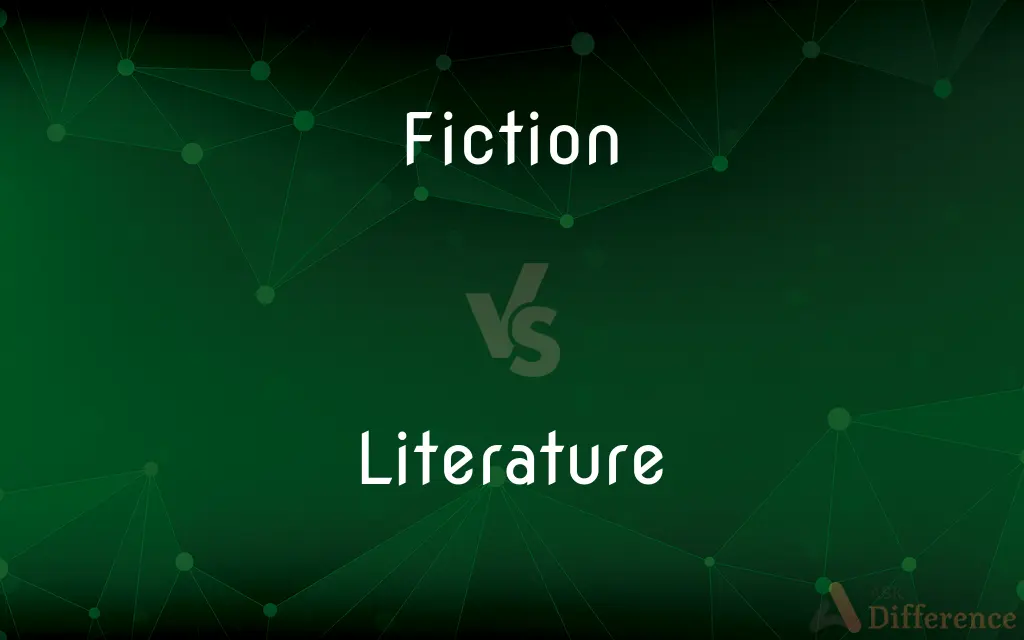Fiction vs. Literature — What's the Difference?
Edited by Tayyaba Rehman — By Fiza Rafique — Updated on March 20, 2024
Factoring involves selling invoices to a third party to improve cash flow, while forfaiting is a financing method where exporters sell their receivables to a forfaiter.

Difference Between Fiction and Literature
Table of Contents
ADVERTISEMENT
Key Differences
Factoring is a financial transaction where businesses sell their accounts receivable (invoices) to a third party (the factor) at a discount to improve cash flow and reduce risk. Forfaiting, on the other hand, is a form of export financing where an exporter sells its claims under export contracts to a forfaiter, typically a financial institution, at a discount.
While factoring usually involves the sale of short-term receivables of up to 90 days, forfaiting typically deals with longer-term receivables from 180 days to several years. This difference in the term of receivables makes factoring more suitable for managing day-to-day operations, whereas forfaiting is often used for capital-intensive transactions, such as infrastructure projects or heavy machinery sales.
Factoring often includes services such as collection, ledger management, and credit protection, providing a comprehensive solution to manage receivables. Forfaiting, in contrast, is primarily focused on providing immediate liquidity and transferring the credit risk of international trade transactions, without involving additional services.
Another key difference is that factoring can be with recourse or without recourse, meaning the risk of non-payment can either remain with the seller or be transferred to the factor. Forfaiting, however, is always without recourse, transferring the credit risk of the receivables from the seller to the forfaiter.
Factoring is more commonly used by small to medium-sized enterprises (SMEs) for domestic transactions, while forfaiting is typically utilized by larger corporations in international trade. This reflects the different financial needs and risk profiles of businesses engaged in domestic versus international commerce.
ADVERTISEMENT
Comparison Chart
Definition
Selling invoices at a discount to improve cash flow.
Selling export receivables at a discount to transfer risk.
Term of Receivables
Short-term, usually up to 90 days.
Longer-term, from 180 days to several years.
Services Included
Collection, ledger management, credit protection.
Primarily focused on liquidity and risk transfer.
Recourse
Can be with or without recourse.
Always without recourse.
Typical Users
SMEs for domestic transactions.
Larger corporations in international trade.
Compare with Definitions
Fiction
Focuses on short-term receivables, usually not exceeding 90 days.
Most of the receivables factored by the company were due in the next 60 days.
Literature
Always without recourse, thereby transferring the credit risk from the seller to the forfaiter.
By choosing forfaiting, the exporter was relieved of the credit risk associated with the receivables.
Fiction
Typically used by small to medium-sized enterprises to secure immediate working capital.
Small businesses often resort to factoring to overcome cash flow challenges.
Literature
Used by larger companies, particularly in international trade, to finance export transactions.
The multinational corporation frequently used forfaiting for its overseas deals.
Fiction
Factoring is a financial strategy where businesses sell their accounts receivable to a third party.
To manage its cash flow better, the company decided to factor its outstanding invoices.
Literature
Deals with longer-term receivables, often ranging from six months to several years.
The receivables sold to the forfaiter had maturities extending up to two years.
Fiction
Factoring can be with or without recourse, affecting the risk of credit.
The company chose non-recourse factoring to eliminate the risk of non-payment.
Literature
Forfaiting is a financing method where exporters sell their long-term receivables to a forfaiter.
To ensure immediate cash flow, the exporter opted for forfaiting its receivables.
Fiction
Factoring services may include credit management, collection services, and ledger management.
The factoring company provided the business with comprehensive credit management services.
Literature
Forfaiting primarily focuses on liquidity enhancement and risk transfer without additional services.
Through forfaiting, the company transferred the credit risk of the transaction to the forfaiter.
Fiction
Fiction is any creative work (chiefly, any narrative work) consisting of people, events, or places that are imaginary—in other words, not based strictly on history or fact. In its most narrow usage, fiction refers to written narratives in prose and often specifically novels, though also novellas and short stories.
Literature
Literature broadly is any collection of written work, but it is also used more narrowly for writings specifically considered to be an art form, especially prose fiction, drama, and poetry. In recent centuries, the definition has expanded to include oral literature, much of which has been transcribed.
Fiction
Literature in the form of prose, especially novels, that describes imaginary events and people.
Literature
Written works, especially those considered of superior or lasting artistic merit
A great work of literature
Fiction
Something that is invented or untrue
They were supposed to be keeping up the fiction that they were happily married
Literature
The body of written works of a language, period, or culture.
Fiction
The category of literature, drama, film, or other creative work whose content is imagined and is not necessarily based on fact.
Literature
Imaginative or creative writing, especially of recognized artistic value
"Literature must be an analysis of experience and a synthesis of the findings into a unity" (Rebecca West).
Fiction
Works in this category
The fiction of Virginia Woolf.
Literature
The art or occupation of a literary writer.
Fiction
A work within this category
The shorter fictions of Faulkner.
Literature
The body of written work produced by scholars or researchers in a given field
Medical literature.
Fiction
Narrative, explanatory material, or belief that is not true or has been imagined or fabricated
The notion that he was at the scene of the crime is pure fiction.
Literature
Printed material
Collected all the available literature on the subject.
Fiction
A narrative, explanation, or belief that may seem true but is false or fabricated
"Neutrality is a fiction in an unneutral world" (Howard Zinn).
Literature
(Music) All the compositions of a certain kind or for a specific instrument or ensemble
The symphonic literature.
Fiction
(Law) A verbal contrivance that is in some sense inaccurate but that accomplishes a purpose, as in the treatment of husband and wife as one person or a corporation as an entity.
Literature
The body of all written works.
Fiction
(literature) Literary type using invented or imaginative writing, instead of real facts, usually written as prose.
I am a great reader of fiction.
The fiction section of the library
Literature
The collected creative writing of a nation, people, group, or culture.
Fiction
A verbal or written account that is not based on actual events (often intended to mislead).
The company’s accounts contained a number of blatant fictions.
The butler’s account of the crime was pure fiction.
Separate the fact from the fiction
Literature
(usually preceded by the) All the papers, treatises, etc. published in academic journals on a particular subject.
Fiction
(legal) A legal fiction.
Literature
Written fiction of a high standard.
However, even “literary” science fiction rarely qualifies as literature, because it treats characters as sets of traits rather than as fully realized human beings with unique life stories. —Adam Cadre, 2008
Fiction
The act of feigning, inventing, or imagining; as, by a mere fiction of the mind.
Literature
Learning; acquaintance with letters or books.
Fiction
That which is feigned, invented, or imagined; especially, a feigned or invented story, whether oral or written. Hence: A story told in order to deceive; a fabrication; - opposed to fact, or reality.
The fiction of those golden apples kept by a dragon.
When it could no longer be denied that her flight had been voluntary, numerous fictions were invented to account for it.
Literature
The collective body of literary productions, embracing the entire results of knowledge and fancy preserved in writing; also, the whole body of literary productions or writings upon a given subject, or in reference to a particular science or branch of knowledge, or of a given country or period; as, the literature of Biblical criticism; the literature of chemistry.
Fiction
Fictitious literature; comprehensively, all works of imagination; specifically, novels and romances.
The office of fiction as a vehicle of instruction and moral elevation has been recognized by most if not all great educators.
Literature
The class of writings distinguished for beauty of style or expression, as poetry, essays, or history, in distinction from scientific treatises and works which contain positive knowledge; belles-lettres.
Fiction
An assumption of a possible thing as a fact, irrespective of the question of its truth.
Literature
The occupation, profession, or business of doing literary work.
The origin of all positive science and philosophy, as well as of all literature and art, in the forms in which they exist in civilized Europe, must be traced to the Greeks.
Learning thy talent is, but mine is sense.
Some gentlemen, abounding in their university erudition, fill their sermons with philosophical terms.
Fiction
Any like assumption made for convenience, as for passing more rapidly over what is not disputed, and arriving at points really at issue.
Literature
Creative writing of recognized artistic value
Fiction
A literary work based on the imagination and not necessarily on fact
Literature
The humanistic study of a body of literature;
He took a course in Russian lit
Fiction
A deliberately false or improbable account
Literature
Published writings in a particular style on a particular subject;
The technical literature
One aspect of Waterloo has not yet been treated in the literature
Literature
The profession or art of a writer;
Her place in literature is secure
Common Curiosities
Can factoring include additional services?
Yes, factoring often includes collection, ledger management, and credit protection services.
What is factoring?
Factoring is the sale of accounts receivable to a third party to improve cash flow.
Is forfaiting always without recourse?
Yes, forfaiting is always conducted without recourse to the seller.
Who typically uses forfaiting?
Larger corporations use forfaiting for financing international trade transactions.
What is forfaiting?
Forfaiting is the sale of export receivables at a discount to transfer the associated credit risk.
Who typically uses factoring?
Small to medium-sized enterprises commonly use factoring for domestic transactions.
What kind of companies benefit from factoring?
Companies in need of immediate working capital or those looking to manage cash flow effectively benefit from factoring.
How does forfaiting mitigate risk for exporters?
Forfaiting mitigates risk by transferring the credit risk of the receivables from the exporter to the forfaiter.
How do factoring and forfaiting differ in terms of receivable terms?
Factoring deals with short-term receivables, whereas forfaiting involves longer-term receivables.
What is the main advantage of forfaiting?
The main advantage of forfaiting is the immediate cash flow and transfer of credit risk from the exporter to the forfaiter.
Can small businesses use forfaiting?
While typically used by larger companies, small businesses can also use forfaiting if they are involved in international trade.
Can forfaiting be used for domestic transactions?
Forfaiting is primarily used for international trade transactions due to its focus on export receivables.
Why might a business choose factoring over a traditional loan?
Businesses might choose factoring for its quicker access to cash and no requirement for collateral in the form of physical assets.
What risks are associated with factoring?
Depending on whether it is with or without recourse, factoring can involve risks related to the collection of receivables.
Share Your Discovery

Previous Comparison
Hip vs. Cool
Next Comparison
Cheap vs. DearAuthor Spotlight
Written by
Fiza RafiqueFiza Rafique is a skilled content writer at AskDifference.com, where she meticulously refines and enhances written pieces. Drawing from her vast editorial expertise, Fiza ensures clarity, accuracy, and precision in every article. Passionate about language, she continually seeks to elevate the quality of content for readers worldwide.
Edited by
Tayyaba RehmanTayyaba Rehman is a distinguished writer, currently serving as a primary contributor to askdifference.com. As a researcher in semantics and etymology, Tayyaba's passion for the complexity of languages and their distinctions has found a perfect home on the platform. Tayyaba delves into the intricacies of language, distinguishing between commonly confused words and phrases, thereby providing clarity for readers worldwide.














































